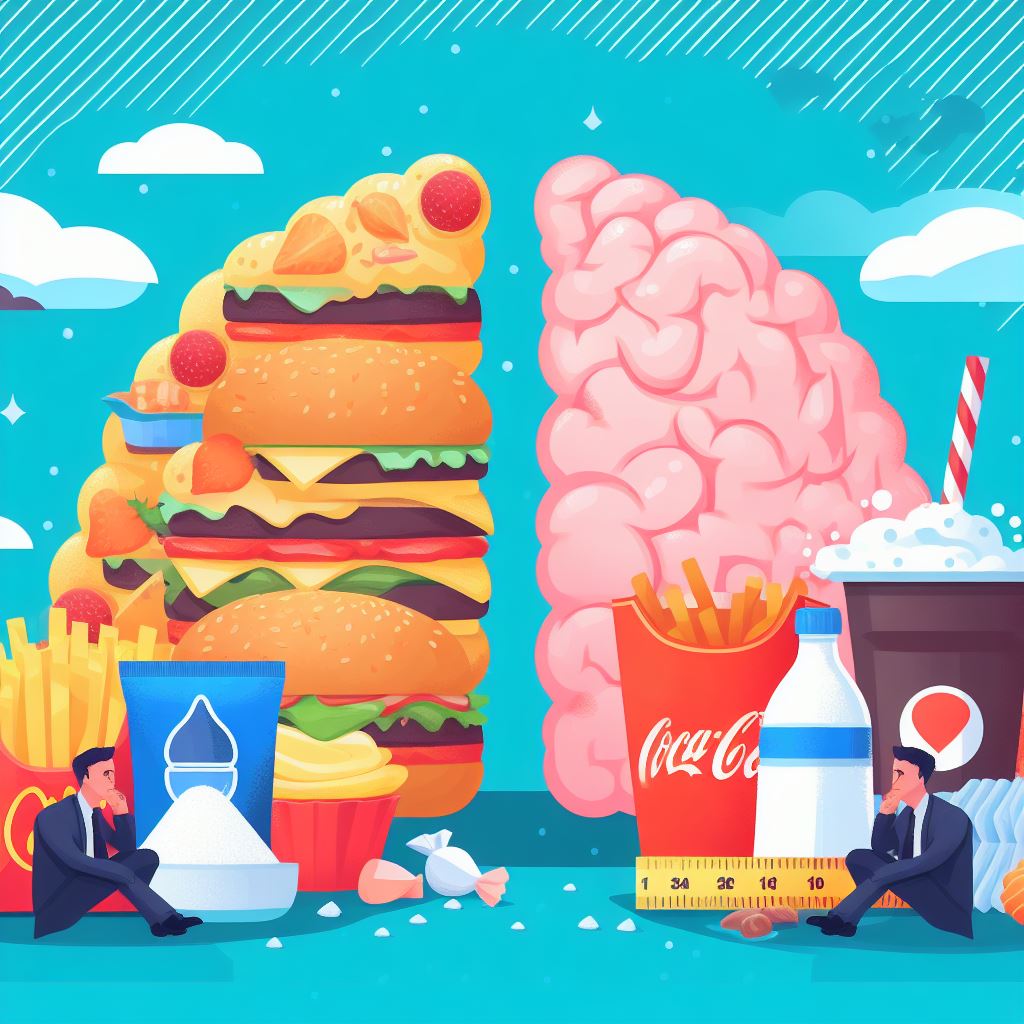The key to a happy mind? A healthy diet—explore the growing science linking nutrition and mental health.
Table of Contents
The connection between nutrition and mental health
Nutrition plays a crucial role in maintaining good mental health. The food we consume provides the necessary nutrients for the brain to function properly. Research has shown that certain nutrients, such as omega-3 fatty acids found in fish and nuts, can improve mood and reduce symptoms of depression and anxiety.
Moreover, a balanced diet rich in fruits, vegetables, whole grains, and lean proteins can support overall brain health. These foods provide essential vitamins and minerals that are vital for cognitive function. On the other hand, a diet high in processed foods, saturated fats, and added sugars can have negative effects on mental well-being.
The connection between nutrition and mental health is undeniable. By making conscious choices about what we eat, we can positively impact our mood, cognition, and overall mental well-being. It is important to prioritize a balanced diet to nurture both our physical and mental health.
The article covers the following points:
- Nutrition and mental health connection
- Impact on mood and health
- Mood-improving foods
- Coping with depression nutritionally
- Lifestyle factors for mental health
The impact of nutrition on mood and mental health
Nutrition plays a crucial role in influencing mood and mental health. The food we consume provides essential nutrients that support brain function and regulate neurotransmitters responsible for our emotions. A well-balanced diet rich in fruits, vegetables, whole grains, lean proteins, and healthy fats can positively impact our mood.
Certain nutrients have been found to have specific effects on mental well-being. For instance, omega-3 fatty acids found in fish, flaxseeds, and walnuts are known to reduce symptoms of depression and improve overall cognitive function. Similarly, foods high in antioxidants such as berries, leafy greens, and dark chocolate can help combat oxidative stress and promote a positive mood.
Conversely, a diet high in processed foods, refined sugars, and unhealthy fats may contribute to mood disorders like depression and anxiety. These types of foods can lead to inflammation within the body and negatively affect neurotransmitter balance.
Prioritizing nutrition is essential for maintaining optimal mental health. By adopting a diet rich in nutrient-dense foods while avoiding processed options, we can support our emotional well-being and enhance our overall mood.

Foods that can improve your mood
Certain foods have the power to uplift our moods and improve overall well-being. One such food is dark chocolate, which contains compounds that stimulate the release of endorphins, commonly known as feel-good hormones. Additionally, dark chocolate also boosts serotonin levels in the brain, helping to regulate mood and reduce stress.
Another food that can enhance mood is fatty fish like salmon or tuna. These types of fish are rich in omega-3 fatty acids, which play a crucial role in brain health. Omega-3s have been linked to a lower risk of depression and can help improve symptoms of anxiety. Incorporating fatty fish into your diet on a regular basis may contribute to a happier and more stable mood.
Furthermore, whole grains like oats or quinoa are beneficial for maintaining good mental health. They are complex carbohydrates that provide a slow and steady release of glucose into the bloodstream, promoting stable energy levels throughout the day. This helps prevent sudden spikes and crashes in blood sugar, which can negatively affect mood and lead to irritability or fatigue.
IIncorporating dark chocolate, fatty fish, and whole grains into your diet can have positive effects on your mood. By consuming these foods regularly, you may experience an improvement in your overall well-being and enjoy a more balanced emotional state.
Nutritional strategies for coping with depression
Depression is a complex condition that can greatly impact a person’s overall well-being. While nutrition alone cannot cure depression, making certain dietary changes can play a supportive role in alleviating symptoms and improving mental health.
Firstly, incorporating nutrient-rich foods into your diet is essential. Focus on consuming whole grains, lean proteins, fruits, and vegetables. These foods provide essential vitamins, minerals, and antioxidants that promote brain health and help balance mood.
Furthermore, paying attention to specific nutrients is crucial. Omega-3 fatty acids found in fatty fish like salmon or in walnuts and flaxseeds have been associated with reducing depressive symptoms. Additionally, increasing your intake of B vitamins through sources such as leafy greens, eggs, and legumes may support neurotransmitter production and improve mood regulation.
While nutritional strategies are not a standalone treatment for depression, they can complement other therapeutic approaches. Incorporating nutrient-dense foods and focusing on key nutrients can help support mental well-being alongside professional guidance and emotional support.
Lifestyle factors that support mental health
Maintaining good mental health requires a holistic approach that addresses various lifestyle factors. Firstly, regular exercise plays a crucial role in supporting mental well-being. Engaging in physical activities releases endorphins, also known as feel-good hormones, which can help reduce stress and improve mood. Additionally, exercise promotes better sleep and boosts self-esteem.
Another essential lifestyle factor is maintaining a balanced diet. Consuming nutrient-rich foods such as fruits, vegetables, whole grains, and lean proteins provides the body with the necessary vitamins and minerals to support brain function. A healthy diet not only improves cognitive performance but also helps regulate emotions and reduces the risk of developing mental health disorders.
Furthermore, engaging in activities that promote relaxation and stress reduction can significantly contribute to mental well-being. Techniques such as meditation, deep breathing exercises, or practicing mindfulness can help manage anxiety and improve overall mental resilience. Prioritizing self-care activities like getting enough rest, socializing with loved ones, pursuing hobbies or interests can also play a vital role in maintaining a healthy mind.
Adopting certain lifestyle choices can have a profound impact on mental health. Regular exercise, a balanced diet, and incorporating relaxation techniques into daily routines are all strategies that support overall well-being and contribute to improved mental health outcomes.
Conclusion: The importance of a balanced diet for mental well-being
A balanced diet plays a crucial role in maintaining mental well-being. It provides the necessary nutrients that support brain function and help regulate mood. When our bodies receive the right balance of vitamins, minerals, proteins, carbohydrates, and fats, it positively impacts our cognitive abilities and emotional stability.
Firstly, a balanced diet ensures proper nourishment for the brain. Essential nutrients like omega-3 fatty acids found in fish and whole grains help promote healthy brain development and function. These nutrients have been linked to improved memory, focus, and overall cognitive performance. Additionally, consuming a variety of fruits and vegetables provides antioxidants that protect brain cells from damage caused by oxidative stress.
Furthermore, a balanced diet helps stabilize mood and prevent mental health disorders. Nutrients like B vitamins found in leafy greens and legumes are involved in the production of neurotransmitters such as serotonin, which regulates mood. Inadequate intake of these nutrients has been associated with an increased risk of depression and anxiety disorders. Moreover, maintaining stable blood sugar levels through balanced meals can prevent mood swings often associated with fluctuations in glucose levels.
Prioritizing a balanced diet is essential for mental well-being. By fueling our bodies with the right nutrients, we can optimize brain function and support emotional stability. Incorporating a variety of foods into our meals ensures that we obtain all the necessary components for a healthy mind. Let us remember that what we eat not only affects our physical health but also greatly influences our mental state.
Here are some related articles on nutrition and mental health that provide additional context and details:
The Gut-Brain Connection – How the Microbiome Influences Mental Health: https://www.health.harvard.edu/diseases-and-conditions/the-gut-brain-connection
Nutritional Psychiatry: Your Brain on Food: https://www.health.harvard.edu/mind-and-mood/nutritional-psychiatry-your-brain-on-food
The impact of diet and nutrition on mental health: https://www.medicalnewstoday.com/articles/diet-and-mental-health
The Mediterranean Diet and Depression Risk: https://www.healthline.com/nutrition/mediterranean-diet-and-depression
Can Certain Foods Improve Your Mental Health?: https://www.webmd.com/depression/features/diet-and-depression
Foods linked to better brainpower: https://www.health.harvard.edu/mind-and-mood/foods-linked-to-better-brainpower
These articles provide more details on topics like the gut-brain connection, nutritional psychiatry, effects of specific diets like Mediterranean, foods that can improve mental health, and more. Let me know if you need any other links on this topic!










